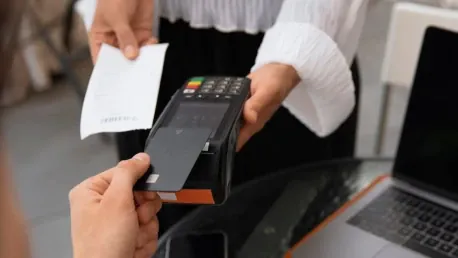Introduction
In the ever-evolving retail industry, ensuring the security of point-of-sale (POS) systems is paramount. POS fraud can significantly impact a business’s financial health and reputation. BMA International, a major fashion retail operator in the Middle East and Asia, successfully tackled these challenges by implementing HID fingerprint readers. This article explores BMA International’s journey from identifying security gaps to adopting biometric authentication, resulting in enhanced security and operational efficiency.
Background of BMA International
Company Overview
Established in 1997 in Dubai, BMA International has grown into a retail powerhouse with over 250 stores across six countries, including Saudi Arabia, the UAE, Bahrain, Oman, Kuwait, and Qatar. Known for their prominent brands, Redtag and twenty4, BMA International built their success on the pillars of customer trust, employee engagement, and a robust supply chain. The company has cultivated a strong reputation based not only on the quality of its products but also on the reliability of its operations. BMA International’s brands are well-regarded for providing affordable fashion and homeware, appealing to a wide customer base across the Middle East and Asia.
Furthermore, the company’s commitment to excellence is evident in its strategic efforts to foster a sustainable and efficient business model. Through a thoughtful mix of customer-centric policies, innovative supply chain management, and a dedicated workforce, BMA International has been able to maintain a competitive edge in a highly dynamic retail market. This strong foundation, however, faced significant challenges when it came to securing their ever-expanding network of retail stores and POS systems.
Initial Challenges
Operating in a vast network, retail environments are particularly vulnerable to fraud. BMA International faced significant security issues with their POS systems, primarily due to the misuse of supervisor credentials. The reliance on smart cards for authentication created loopholes that were frequently exploited, leading to unauthorized transactions and fraudulent activities. Supervisors’ smart cards would often be left with cashiers, permitting unmonitored cancellations and transaction modifications. When employees left the company, they frequently failed to return these smart cards, further complicating security efforts.
This gap in security controls resulted in substantial losses both financially and in terms of inventory. Internal audits revealed that these breaches were not isolated incidents, but rather systemic issues that needed immediate attention. The fraudulent activities ranged from voiding transactions to illicitly obtaining refunds long after the sale had been completed. Such practices not only impacted the company’s bottom line but also eroded trust among stakeholders. The urgency to address these challenges became a pressing concern for BMA International, propelling them towards seeking more foolproof security measures.
Initial Security Measures and Their Flaws
Shift to Smart Cards
In an attempt to mitigate the rampant misuse of supervisor credentials, BMA transitioned from a password-based authentication system to one that used smart cards. While this shift was intended to be a secure upgrade, replacing passwords with ostensibly more reliable smart cards, it introduced its own set of challenges. Supervisors were expected to carry these smart cards to authorize high-level transactions and other sensitive operations. However, supervisors would occasionally leave their smart cards with cashiers, inadvertently facilitating unauthorized activities. Cashiers could exploit the absence of immediate oversight to conduct fraudulent transactions.
The smart cards, designed to sidestep the pitfalls associated with password sharing, ended up perpetuating similar vulnerabilities. The technology, while robust in theory, failed to address human behavior and procedural lapses that contributed to security breaches. Instead of solving the problem, this measure only slightly shifted the nature of the fraud, making it less traceable and more insidious. The realization that smart cards did not fully obviate the risk of fraud highlighted the need for a more advanced and reliable solution.
Continued Security Breaches
Despite the switch to smart cards, BMA experienced continued security breaches. Fraudulent practices, including cashiers voiding transactions post-sale to claim illegal refunds, became pervasive. The persistent misuse of smart cards, due to the ease of sharing and the lack of physical verification, shone a spotlight on the inadequacies of non-biometric systems and underscored the need for a more foolproof solution. The smart card system could not effectively prevent unauthorized access or ensure that only the rightful owner was executing transactions.
Additionally, the physical smart cards could be easily lost or stolen, which added another layer of complexity to the already pressing issue of POS fraud. Employees who left the company would sometimes retain their smart cards, inadvertently or otherwise, posing further risks. These loopholes were significant enough to warrant a deeper examination by BMA’s internal audit committee. Realizing that the current measures were insufficient, and in some cases exacerbating the problem, the company knew it had to explore more secure and technology-driven alternatives.
Decision to Implement Biometric Authentication
Recognizing the Need for Change
The realization that smart cards failed to provide the desired level of security led BMA’s internal audit committee, spearheaded by Nainan M. Kurian, CEO of Technowave International LLC, to explore more secure alternatives. Through a meticulous evaluation process, the committee identified biometric authentication as a promising solution to their security woes. The inherent advantages of biometrics—being unique to each individual and non-transferable—presented an attractive option for enhancing security measures. Unlike smart cards, which could be misplaced or misused, biometric identifiers such as fingerprints are permanently tied to a person, thereby offering a more reliable method of authentication.
Further investigation revealed that biometrics could be seamlessly integrated with BMA’s existing infrastructure, specifically their upcoming Oracle Retail Xstore Office Cloud Service. This compatibility meant that the transition could be executed with minimal disruption to ongoing operations. The audit committee, understanding the urgency and the potential benefits, greenlighted the adoption of biometric technology to address the pervasive security challenges. The goal was to implement a system that could not be easily tampered with, ensuring the integrity and authenticity of each transaction at the POS terminals.
Selection of HID DigitalPersona 4500 Fingerprint Reader
After comprehensive research and evaluations, BMA International, in collaboration with Technowave International, selected the HID DigitalPersona 4500 Fingerprint Reader. The HID DigitalPersona 4500 emerged as the top choice due to its stellar reviews from other retailers and its proven efficacy in high-volume environments. The device’s high compatibility with Oracle Retail Xstore further cemented its selection, offering a seamless integration with BMA’s forthcoming software upgrades. The technology behind the HID reader, based on optical scanning, promised quick and accurate fingerprint captures, making it an ideal candidate for retail use.
Moreover, the HID DigitalPersona 4500’s compact design ensured that it would not disrupt the existing POS setups. Its sleek and professional appearance was a bonus, aligning well with the aesthetics of BMA’s stores. This device not only promised enhanced security through biometric authentication but also ensured ease of use and reliability. The thorough endorsement from peer retailers who had successfully implemented the technology added an extra layer of confidence. BMA International’s strategic decision aimed not just at curbing fraud but also at installing a future-proof security measure that could scale with their expanding operations.
Implementation of Biometric Systems
Seamless Deployment
The transition to biometric authentication was smooth, with minimal disruption to daily operations. Floor supervisors started using the HID DigitalPersona 4500 for POS terminal access, replacing the former smart card system. The sleek, compact USB peripheral fit seamlessly into the retail environment. Technowave International ensured that the deployment was efficient, working closely with BMA’s IT department to integrate the new technology into existing POS terminals. Initial training sessions were conducted to acquaint floor supervisors with the new system, which was generally well-received due to its user-friendly nature.
The HID fingerprint reader’s installation process was straightforward, requiring no significant alterations to the existing POS infrastructure. Software updates and device pairing were executed with minimal downtime, ensuring that retail operations continued unhindered. The biometric authentication system was configured to work in tandem with Oracle Retail Xstore, allowing for real-time synchronization and enhanced data security. The transition phase was marked by a positive reception from the staff, who found the fingerprint authentication method more intuitive and quicker than the smart card system.
Functionality and User Experience
Floor supervisors authenticate access by placing their finger on the reader, which captures and encrypts the fingerprint image. The biometric engine verifies the fingerprint, granting access only upon successful authentication. The immediate visual feedback from the system ensures clarity and efficiency, enhancing the overall user experience. The HID DigitalPersona 4500’s ability to produce accurate reads even under varying lighting conditions and for different skin types stands out as a significant advantage. The supervisors appreciated the speed and convenience of the new system, which required less than a second to authenticate.
To further bolster security, the system was equipped with advanced encryption protocols to ensure that fingerprint data remained secure from any form of tampering or unauthorized access. The fingerprint readers provided intuitive red flash feedback, indicating the completion of the authentication process, thus eliminating any guesswork for the supervisors. This new method eradicated the issues related to smart card sharing, as the biometric system mandated the physical presence of the authorized personnel, making fraudulent access nearly impossible. The resultant operational efficiency and heightened security were immediately noticeable, marking a huge milestone in BMA’s journey towards tighter POS security.
Impact of Biometric Authentication
Reduction in Fraudulent Activity
With the deployment of over 1,100 HID fingerprint readers across their stores, BMA International witnessed a significant decline in POS fraud. The physical presence required for biometric authentication closed the loophole that had previously allowed unauthorized transactions. Supervisors now had to be physically present to authorize any significant POS actions, thereby eliminating the possibility of handing over credentials to unauthorized employees. This shift resulted in an immediate decrease in fraudulent activities, especially the post-sale voiding of transactions for illicit refunds.
The biometric system’s robust tracking capabilities allowed for precise monitoring of all POS activities, ensuring complete accountability. Any attempt to circumvent the biometric system was immediately flagged and dealt with, thus providing a deterrent against potential fraudsters. The undeniable link between the fingerprint and the person conducting the transaction fortified the security framework, resulting in an enhanced sense of integrity and trust within the organization. This significant reduction in fraudulent activity translated to improved revenue protection and inventory management, assisting BMA International in reclaiming its financial stability and operational efficiency.
Operational Benefits
In addition to reducing fraud, the biometric system improved attendance and punctuality among floor supervisors. The system’s inherent requirement for physical presence during the authentication process meant that supervisors were more diligent in adhering to their schedules. Additionally, the multi-authentication capabilities of the HID system offered flexibility, enabling supervisors to work across various locations efficiently. The biometric reader could store multiple fingerprints, allowing for seamless authentication regardless of the supervisor’s location within BMA’s expansive store network.
The improved attendance and punctuality had a ripple effect, positively impacting store operations and customer service levels. Supervisors were consistently present to oversee transactions and ensure operational smoothness, significantly enhancing store performance. The biometric system’s real-time data logging capabilities provided valuable insights into attendance patterns and workforce management. This data-driven approach enabled BMA to streamline its operations further and optimize resource allocation, contributing to a more efficient and productive workforce. The confluence of these operational benefits underscored the success of the biometric system well beyond its primary security function.
Enhanced Inventory and Revenue Management
The biometric system played a crucial role in enhancing inventory management and protecting revenue. HID Global’s robust support allowed BMA to fully leverage the system, resulting in better accountability and operational efficiency. With fraudulent activities significantly curtailed, inventory discrepancies were minimized, leading to more accurate stock management. This improvement in inventory control directly impacted revenue management, as losses due to theft or fraud were drastically reduced.
The rigorous authentication process ensured that all transactions were legitimate, thereby protecting the company’s revenue streams. BMA was able to focus on strategic growth and customer satisfaction without the constant drain of resources needed to combat internal fraud. HID Global’s ongoing support provided a safety net, ensuring that the biometric system remained up-to-date and functional. This reliable partnership allowed BMA to maintain a high level of operational integrity, reinforcing its market position and paving the way for future advancements in retail security technology.
Broader Implications and Industry Trends
Rise of Biometric Technologies in Retail
BMA International’s successful deployment of biometrics reflects a growing trend in the retail industry towards advanced security measures. Biometric technologies offer a secure, non-transferable means of authentication, proving to be more effective than traditional methods. Across the global retail landscape, businesses are increasingly looking towards biometrics to address vulnerabilities associated with conventional authentication systems. The non-replicable nature of biometric data, such as fingerprints, iris patterns, and facial recognition, offers an unparalleled level of security that passwords and smart cards cannot match.
Industry analysts suggest that the adoption of biometric solutions is set to rise exponentially, as retailers recognize the dual benefits of enhanced security and operational efficiency. The advancement in biometric technologies, coupled with decreasing costs of deployment, makes it a viable option even for small and medium-sized retailers. Furthermore, consumer confidence in biometric technologies is growing, driven by their common usage in personal devices like smartphones and laptops. This broader acceptance is paving the way for widespread adoption in the retail sector, heralding a new era of secure, efficient, and fraud-resistant business operations.
Future of Retail Security
As BMA’s case demonstrates the efficacy of biometric authentication in combating retail fraud, it is likely that more retailers will adopt similar technologies. This shift points to a future where sophisticated security solutions are standard practice in the retail sector, safeguarding businesses from the ever-evolving threats of fraud and theft. Retailers are likely to invest heavily in biometric systems not only to prevent fraud but also to optimize operational workflows, improve employee accountability, and enhance customer experiences.
Future developments in biometric technology, such as integration with AI and machine learning, could provide even more robust security solutions. These advancements would enable systems to learn and adapt, offering real-time threat detection and prevention capabilities. Retailers who proactively adopt these technologies will likely find themselves at the forefront of industry trends, enjoying enhanced security and operational benefits. As biometric systems become more advanced and integrated into the fabric of retail operations, the industry is poised to achieve unprecedented levels of security and efficiency, shaping the future of retail in profound ways.









